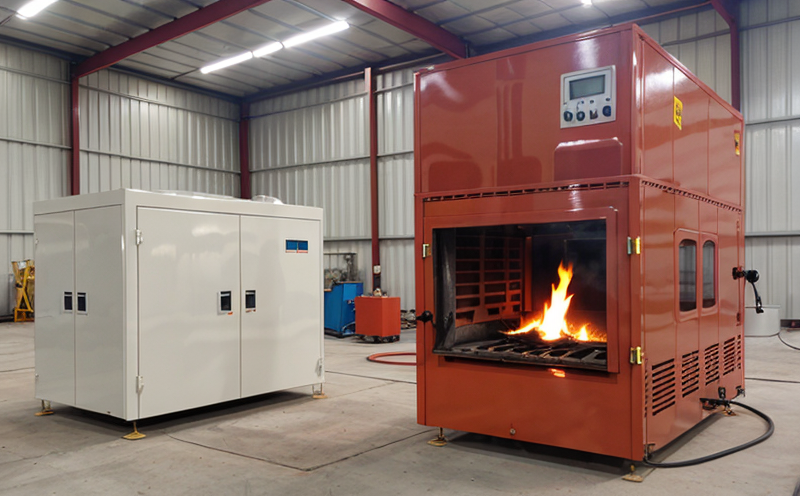ASTM D696 Coefficient of Thermal Expansion Testing
The ASTM D696 standard is a critical tool used to determine the linear coefficient of thermal expansion (CTE) for metals and alloys. This test is particularly important in sectors such as aerospace, automotive, and electronics where materials must maintain their structural integrity under varying temperatures.
Thermal expansion is a fundamental physical property that describes how much a material expands or contracts with changes in temperature. The coefficient of thermal expansion quantifies this relationship by measuring the fractional change in length per degree Celsius increase at constant stress for small temperature changes.
The ASTM D696 test method involves precise measurement techniques to ensure accurate determination of CTE. Specimens are typically heated and cooled in a controlled environment, often using an induction or laser-heated furnace. The expansion or contraction is measured using specialized equipment such as dilatometers or thermomechanical analysers (TMA).
The ASTM D696 test provides data critical for designing products that will perform reliably under thermal stress. This information helps in selecting appropriate materials, optimizing manufacturing processes, and ensuring product longevity.
- Customer Impact: Ensures product reliability by identifying potential temperature-related issues early in the design process.
- Satisfaction: Enhances customer confidence in the quality of materials used in their products.
The ASTM D696 test is widely recognized and accepted, making it a valuable standard for industries that require precise material properties. Compliance with this standard ensures that materials meet the stringent requirements set by leading manufacturers and regulatory bodies.
For instance, aerospace companies rely on ASTM D696 results to ensure that critical components like engine parts or structural frames do not deform under extreme operating temperatures. In automotive manufacturing, accurate CTE values are essential for designing brake systems or exhaust manifolds that can withstand high heat without failure.
In the electronics sector, this test is crucial for ensuring that circuit boards and semiconductors remain stable even in fluctuating environments. By adhering to ASTM D696 standards, these industries not only enhance product performance but also reduce the risk of costly recalls and maintenance issues.
Scope and Methodology
The ASTM D696 test is designed for metals and alloys with a wide range of thermal expansion coefficients. The primary scope includes materials like steel, aluminum, copper, and nickel, which are common in various industrial applications. The method involves heating the specimen at a controlled rate while monitoring its length change using an accurate measuring device.
The testing procedure typically follows these steps:
- Material preparation: Ensure that the sample is uniform and free from defects that could affect the test results.
- Calibration of equipment: Verify the accuracy of the dilatometer or TMA instrument before starting the test.
- Heating process: Heat the specimen at a constant rate within the temperature range specified in ASTM D696. This ensures consistent data collection and comparison across different materials.
- Data recording: Record the length changes at regular intervals throughout the heating cycle. The data is then used to calculate the CTE using specific formulas provided in the standard.
The ASTM D696 test method also includes considerations for post-test analysis, such as allowing the specimen to cool back to room temperature and ensuring that any residual stresses are minimized before measurement.
By adhering strictly to these procedures, laboratories can produce reliable and consistent results that meet international standards. This ensures that manufacturers have confidence in the accuracy of the test data they receive from independent third-party testing facilities like ours.
Why Choose This Test
Selecting ASTM D696 Coefficient of Thermal Expansion Testing offers several advantages for materials scientists, engineers, and quality assurance professionals:
- Accurate Data: The test provides precise measurements that are essential for predicting how a material will behave in real-world conditions.
- Compliance: Ensuring compliance with international standards like ASTM D696 is crucial for meeting regulatory requirements and gaining market entry into competitive industries.
- R&D Support: The test aids research and development efforts by providing detailed insights into material properties that can influence product design decisions.
- Cost-Effective: Early identification of potential issues through ASTM D696 testing helps prevent costly errors downstream in the manufacturing process.
In addition to these benefits, choosing this test ensures that your materials meet the highest quality standards, thereby enhancing product performance and reliability. This is particularly important when dealing with critical components where even small deviations from expected behavior can have significant consequences.
At our laboratory, we pride ourselves on delivering accurate, reliable, and timely results. Our experienced staff and state-of-the-art facilities ensure that every test meets or exceeds the requirements set by ASTM D696. Whether you are a quality manager overseeing compliance or an R&D engineer seeking detailed thermal properties data, we have the expertise to support your needs.





